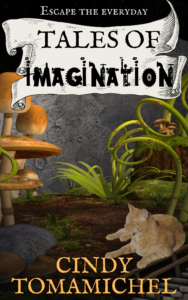The need for humans to believe in some being greater than themselves is very strong. For most of our past, religion has been a big factor in culture, laws, art and daily life. Sometimes for good, more often as a tool to control others.

How does spirituality enter into world building? Does the author ignore it as being potentially too controversial, too politically incorrect? Or do they use it as a hammer to bang home a message of morality the reader cannot ignore? Is it a message of peace, or one of oppression? Is it woven tightly into the culture with laws and ceremonies, or is it something remote from the daily life of the people? How does it balance with science? How is it reflected in buildings or the law?
It’s a delicate tightrope to balance a novel and a spiritual message. Not enough and the people and their world in the novel may feel shallow. Too much, and it can betray the author into sermonising more than entertaining.
As a genre, fantasy probably wins this balance. Authors can use some historical incidents or a culture and weave it into darkness or light depending on viewpoint. A struggle between the dark and light can involve magic of various sorts, and then the nature of the wielder balances the force. A Star Wars balance to the universe if you like, where good and evil are different sides of the same power. Or the use of magic could be a gender matched theme, with the pagan witches in touch with nature are at odds with the men in control wielding iron weapons. Expanding spirituality into the environment can make for powerful reading.
Sci-fi can deal with spirituality in a number of ways. A throwback to the past with the discovery of a lost colony. A few stories in Heinlein and Alan Dean Foster refer to colonised planets that cut themselves off from the universe, with themes of genetically engineered super humans, or ones with a strong and compulsory religious belief. A common factor is the extremists cut themselves off from outside influence. DS9 in Star Trek uses the spirituality of the Bajorans frequently as a plot device and a way to deepen understanding of the people. So for sci-fi, the contrast in the visitors vs the planet inhabitants is probably the most interesting way to display spirituality and culture.
Historical novels have a heavy burden. Not only do they need to get the history correct, they also have to accommodate current day readers. In one of the Laura Ingalls books, she spends time with a highly religious family, and Sundays were a day of no work, and only reading the bible was permitted. A time travelling modern woman bumps into a mass of morality codes and customs that could get her burnt as a witch or assaulted as a prostitute. One criticism of historical novels is making the characters speak or act like modern people – and yet trying to make characters reflect their age runs a risk of alienating modern readers with behaviours and prejudices long since forgotten. So spirituality is a dangerous thing in a novel. The author has to get into the heads of another species or culture, and drag the reader with them, even if the culture is an ugly one, or the belief itself is illogical. It’s possibly one area where it is hardest for an author to leave themselves behind. No one wants to end a novel that felt like a sermon. But if, for a few hours the reader becomes someone very different, then the author has succeeded in making them think long after the book is finished.
In some bookish news, I have just released a small volume of short stories, poems and flash fiction. Called “Tales of Imagination” it is a set of some of my published works in one place, including the prize wining Crone’s Fairytale, a variation on the Rapunzel story.
Tales of Imagination
Explore the strange byways of imagination in this collection. An eclectic mix of science fiction, award winning romance, comedy, the past – the future, and the just plain weird.
A gourmand on death row – what did he do? What happened to Rudolph Senior? Wishes and a not very Christmassy present. Leave your current life for a desert town where no one knows your name. A desperate future soldier asks for a terrible gift. A deadly virtual reality. Poems on age, words and the thoughts of a woman. A preppers personal apocalypse. An evolutionary change for the better. A boy dreams of a very different life. A choice between immortality and love. An award-winning fractured fairy tale of Rapunzel.
Escape the everyday with twenty-six short stories, flash fictions and poems.
Click here to go to your usual bookstore.
Enjoy this blog? Have a think about signing up via my website or catch them as they fly around the ether on twitter or facebook. They will stay where they are pinned on pinterest.
For those that have not read Druid’s Portal yet, here is a link to the first chapter of DruidsPortal and to the second in the series Druid’s Portal: The Second Journey, and you can read a preview here.
Scifi more your thing? Try my short stories in the anthologies Quantum Soul and Tales from Alternate Earths 2. Or what about horror? Try Haunted, a free new horror anthology.
Are you an author? My book “The Organized Author” is out now. Grab a copy here and get that author platform done!
If you are keen to chat with other scifi peeps, then check out the Knights of the Scifi Roundtable facebook group and subscribe to their newsletter https://mailchi.mp/29fb30bca8e4/update-subscription
Short stories and poetry? Try the Rhetoric Askew anthologies: Mixed genre, Adventure or Romance . Or my own collection Tales of Imagination.
Tired from all that thinking? Try a 5 Minute Vacation! 5 Minute Vacation Now available on Story Origin as a free review copy: https://tinyurl.com/5MVReview
And my own author newsletter, for book news, odd facts, recipes and random freebies. Sign up here. Every subscription gets a free copy of my short stories ‘New Beginnings’ two tales of later in life romance.



Hi Cindy,
Thanks for a broad examination of spirituality in fiction. One of your comments made me chuckle and I had to say something.
“and yet trying to make characters reflect their age runs a risk of alienating modern readers with behaviours and prejudices long since forgotten.”
I laughed at this because to the best of my knowledge ALL the behaviours and the prejudices of the past are still extent in our modern world, somewhere. And in our western society, I believe they’re still extent, but hidden from public view.
Now maybe I’m too cynical and we have made progress. But I wouldn’t bet on it.